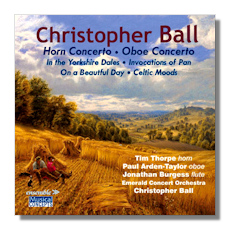
The Internet's Premier Classical Music Source
Related Links
- Ball Reviews
- Latest Reviews
- More Reviews
-
By Composer
-
Collections
DVD & Blu-ray
Books
Concert Reviews
Articles/Interviews
Software
Audio
Search Amazon
Recommended Links
Site News
 CD Review
CD Review
Christopher Ball

Concertos
- Horn Concerto 1
- Oboe Concerto 2*
- Invocations of Pan for Solo Flute 3
- Celtic Moods 4
- In the Yorkshire Dales 5,6
- On a Beautiful Day 5,6
- A Summer Day 5
1 Tim Thorpe, horn
2 Paul Arden Taylor, oboe
3 Jonathan Burgess, flute
4 Roger Armstrong, alto flute
4 Paul Arden-Taylor, English horn
5 Roger Armstrong, flute
5 Paul Arden-Taylor, oboe
6 Leslie Craven, clarinet
Emerald Concert Orchestra/Christopher Ball
* Adderbury Ensemble/Christopher Ball
Musical Concepts MC143 DDD 1996/2010 77:48
Very much in the English pastoral tradition of Vaughan Williams and others, with some folksong influence, these works were written unabashedly to provide pleasurable listening and in that they succeed beautifully. They all have flowing melody, moderate dynamics, and tonal harmony. They are orchestrated for woodwinds, horn and strings, without percussion or heavy brass. The woodwinds are prominently displayed. Neither concerto is a flashy showpiece for the soloist but is more of a cooperative venture.
The Horn Concerto, the most recent of Ball's five concertos for winds, is, as the composer says, unique, in that although others have written music of this sort, no one has ever written a pastoral horn concerto. It begins full-voiced and lively (Allegro energetico) and continues with some lovely counterpoint and flowing melodies for the horn. The succeeding Andante sounds almost like a woodwind quintet, with the horn taking a less prominent part than previously. The movement includes a quote from the folksong, The Oak and the Ash. The final Allegro vigoroso is fugal.
The Oboe Concerto, from 1996, also begins with lively vigor (vivace) and some rising figures. The oboe is accompanied by the full string section. The middle movement, Aubade, has only momentary passing intensity and was intended to be "an evocation of a peaceful summer day in an unspoilt English countryside," with the entire concerto "meant as a tonic and rest from the stresses of present day life." The final movement, Scherzo (Allegro) is exuberant and with a touch of folksong melody.
The Invocations of Pan: Pagan Piper, Pan Overheard, and Pan Piping are in the spirit of Debussy's Syrinx and I don't believe it is a stretch to compare these pieces to Britten's wonderful Metamorphoses for solo oboe, which similarly evokes an ancient pastoral mood. The first two were written originally for recorder and the last for the American flute virtuoso Gary Schocker. As played here, their effect is enhanced by a very fine recording (true of the entire CD) with just the right amount of resonance, and the very full tone of the instrumentalist, particularly in the lower register. I think that Pagan Piper has an edge over the other pieces, which feature more fluttering trills and soaring phrases. The sheer sound of the flute is a delight.
Celtic Moods is a companion piece to Celtic Twilight, the title piece of another of Ball's recordings. Celtic Moods includes dance rhythms as well as "reflective calm."
A Summer Day was one of the first of Ball's compositions, commissioned by the BBC, and has been broadcast over a hundred times, which speaks for itself. The other pieces here were also written for BBC broadcasts and are in a light, pleasant, melodic mode.
Christopher Ball received training in the clarinet and conducting from distinguished teachers, including master classes in conducting, with Monteux, Solti, Mackerras and Norman del Mar. When Barbirolli attended his college performance of the Mozart Clarinet Quintet in Manchester, that conductor called "Bravo" at the end of each movement and shortly thereafter hired him for the Halle Orchestra. Ball's conducting career has earned him acclaim and has included performances at the Royal Opera House, Covent Garden.
As a composer, Ball is self-taught. Now in his seventies, Ball has been composing regularly only in the past fifteen years, as he had been sure that his kind of music would not likely have been welcomed at the height of avant-garde modernism. He has completed five concertos for wind instruments: flute, oboe, clarinet, recorder and horn, as well as two cello concertos and a violin concerto. Besides the works on this disc, three of the others are available on CD.
Highly recommended to anyone who appreciates this kind of music.
Copyright © 2012, R. James Tobin





















